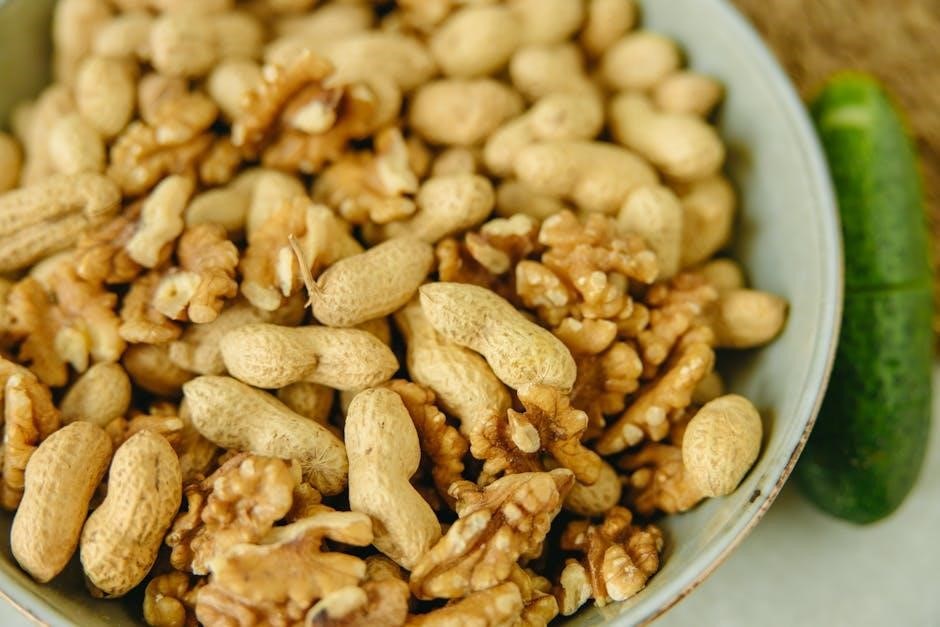Cortisol, often referred to as the “stress hormone,” plays a vital role in the body’s response to stress, regulating metabolism, and maintaining energy levels․ Chronically elevated cortisol levels can lead to weight gain, fatigue, and other health issues, making it essential to manage cortisol through dietary and lifestyle changes to promote overall well-being and prevent chronic conditions․
1․1 Understanding Cortisol: The Stress Hormone
Cortisol, known as the “stress hormone,” is produced by the adrenal glands and plays a crucial role in the body’s response to stress․ It regulates metabolism, energy levels, and immune responses․ While acute cortisol spikes are normal, chronically elevated levels can lead to weight gain, fatigue, and hormonal imbalances․ Managing cortisol through a balanced diet and lifestyle changes is essential for maintaining overall health and preventing chronic conditions․
1․2 The Relationship Between Cortisol and Weight Management
Cortisol significantly impacts weight management by increasing appetite and promoting fat storage, particularly in the abdominal area․ Elevated cortisol levels can lead to overeating and cravings for high-sugar, high-sodium foods, which further contribute to weight gain․ Managing cortisol through a balanced diet, regular exercise, and stress reduction techniques helps regulate metabolism and supports a healthier weight, reducing the risk of obesity-related conditions․
1․3 Why a Cortisol Diet Plan is Essential for Hormone Balance
A cortisol diet plan is crucial for maintaining hormone balance as it helps regulate cortisol levels, preventing hormonal disruptions․ By focusing on nutrient-dense foods, reducing sugar intake, and incorporating stress-lowering activities, individuals can stabilize cortisol, which in turn supports better energy levels, metabolism, and overall hormonal health․ This balanced approach ensures long-term well-being and reduces the risk of chronic health conditions associated with cortisol imbalance․

Foods That Help Lower Cortisol Levels
Incorporating nutrient-rich foods like leafy greens, berries, and omega-3 fatty acids can help reduce cortisol levels by combating stress and inflammation, promoting hormonal balance naturally․
2․1 Leafy Greens and Their Role in Reducing Stress
Leafy greens, such as spinach, kale, and Swiss chard, are rich in magnesium and antioxidants, which play a crucial role in reducing stress and cortisol levels․ Magnesium helps relax muscles, improves sleep quality, and supports adrenal function, while antioxidants combat oxidative stress, fostering a balanced hormonal response․ Incorporating these greens into meals can provide a natural way to regulate cortisol and promote overall well-being․
2․2 Berries: A Rich Source of Vitamin C and Antioxidants
Berries, such as blueberries, strawberries, and raspberries, are packed with vitamin C and antioxidants that help reduce cortisol levels by combating oxidative stress․ Vitamin C supports adrenal function, while antioxidants promote hormonal balance․ Their anti-inflammatory properties also aid in managing stress-related inflammation, making berries a convenient and nutritious addition to a cortisol-lowering diet plan․
2․3 Incorporating Omega-3 Fatty Acids for Hormone Regulation
Omega-3 fatty acids, found in fatty fish like salmon, flaxseeds, and walnuts, play a crucial role in reducing inflammation and balancing hormones․ These essential fats support adrenal function, helping to regulate cortisol levels naturally․ Incorporating omega-3-rich foods into your diet can enhance hormone regulation, promote relaxation, and contribute to an overall reduction in stress-induced cortisol spikes, making them a vital component of a cortisol-lowering diet plan․
Foods to Avoid in a Cortisol Diet Plan
Certain foods can disrupt cortisol balance, leading to increased stress and health issues․ Avoiding high-sugar, processed, and inflammatory foods is essential for maintaining optimal hormone health and stability․
3․1 The Impact of High-Sugar Foods on Cortisol Levels
High-sugar foods cause rapid spikes in blood sugar, triggering insulin surges and energy crashes․ This fluctuation can increase cortisol production, as the body perceives these crashes as stress․ Regularly consuming high-sugar foods may lead to chronically elevated cortisol levels, contributing to belly fat storage and metabolic issues․ Limiting sugary foods is essential for maintaining hormone balance and overall health․
3․2 Limiting Processed Foods for Better Hormone Balance
Processed foods are often high in unhealthy fats, sodium, and artificial additives, which can disrupt hormone balance․ They contribute to inflammation and insulin resistance, both of which can elevate cortisol levels․ Reducing processed foods and opting for whole, nutrient-dense ingredients helps maintain stable hormones, supports adrenal function, and promotes long-term health․

3․3 Understanding the Role of Caffeine and Alcohol
Caffeine and alcohol can significantly impact cortisol levels․ Caffeine, particularly in high amounts, mimics a stress response, temporarily raising cortisol․ Alcohol disrupts sleep patterns, which can lead to increased cortisol production․ Reducing or avoiding these substances helps maintain balanced cortisol levels․ Opting for herbal teas instead of coffee and choosing water or natural juices over alcohol supports a healthier hormonal balance and overall well-being․
The Importance of Hydration and Electrolytes
Proper hydration and electrolyte balance are crucial for managing cortisol levels․ Drinking water helps regulate stress hormones, while electrolytes support adrenal function and overall hormonal stability, reducing stress․
4․1 Drinking Water and Its Effect on Cortisol Levels
Drinking water is essential for maintaining healthy cortisol levels․ Dehydration can increase cortisol, as the body perceives lack of water as stress․ Staying hydrated helps regulate stress hormones and supports adrenal function․ Aim to drink at least a gallon and a half of water daily, preferably with electrolytes, to maintain balance and reduce cortisol-related stress․ Proper hydration is a simple yet effective way to support hormonal health and overall well-being․
4․2 The Role of Electrolytes in Maintaining Hormone Balance
Electrolytes, such as magnesium, potassium, and sodium, are crucial for maintaining hormone balance and regulating cortisol levels․ They support cellular function, nerve signaling, and hydration, all of which are essential for adrenal health․ Including electrolyte-rich foods like bananas, avocados, and leafy greens in your diet helps stabilize cortisol levels and prevents imbalances caused by dehydration or nutrient deficiencies․ Balancing electrolytes is vital for optimal hormonal function and overall health․

Exercise and Cortisol Management
Moderate exercise helps lower cortisol levels, improving mental and physical health․ Activities like yoga and brisk walking are ideal, while overtraining can spike cortisol, disrupting balance․
5․1 The Benefits of Moderate Exercise for Lowering Cortisol
Moderate exercise, such as yoga or brisk walking, can significantly reduce cortisol levels․ Physical activity stimulates endorphins, which help alleviate stress and improve mood․ Regular moderate exercise supports adrenal health, helping regulate cortisol production and maintain hormonal balance․ It also enhances sleep quality, further contributing to lower cortisol levels and overall well-being․ Consistency is key to achieving these benefits․
5․2 Avoiding Overtraining to Prevent Cortisol Surges
Overtraining can lead to cortisol surges, disrupting hormone balance and negatively impacting health․ Avoid excessive or high-intensity workouts, especially in the late afternoon or evening, as they can interfere with sleep and cortisol regulation․ Incorporate activities like yoga or light walking to reduce stress without overtaxing the body․ Listening to your body and balancing exercise with recovery is crucial for maintaining healthy cortisol levels and overall well-being․
Sleep and Its Role in Cortisol Regulation
Sleep is essential for cortisol balance․ Maintaining a consistent sleep schedule helps regulate cortisol levels, promoting better health and stress management effectively․
6․1 The Importance of Consistent Sleep Schedules
Consistent sleep schedules are crucial for maintaining healthy cortisol levels․ By going to bed and waking up at the same time daily, your body establishes a routine, which helps regulate cortisol production․ This consistency supports adrenal function, reduces stress, and enhances overall hormonal balance, making it easier to manage weight and improve energy levels throughout the day․

6․2 Enhancing Sleep Quality Through Diet
A diet rich in sleep-promoting nutrients can significantly improve sleep quality․ Incorporate foods like bananas, rich in potassium, and tart cherries, which boost melatonin levels․ Avoid high-sugar and processed foods that disrupt blood sugar balance․ Herbal teas, such as chamomile, and electrolyte-rich beverages can also promote relaxation․ A balanced cortisol diet plan supports better sleep, ensuring your body functions optimally and maintains healthy hormone levels․

Mindfulness and Stress Reduction Techniques
Mindfulness practices, such as meditation and deep breathing, are powerful tools for reducing cortisol levels․ These techniques promote relaxation, lower stress, and enhance emotional resilience, supporting overall well-being․
7․1 The Impact of Mindfulness on Cortisol Levels
Mindfulness practices, such as meditation and deep breathing, have been shown to significantly reduce cortisol levels by promoting relaxation and lowering stress․ Studies indicate that regular mindfulness exercises can lead to a decrease in cortisol production, enhancing emotional well-being and hormonal balance․ Incorporating these techniques into daily routines helps manage stress and supports long-term health․
7․2 Incorporating Meditation and Deep Breathing Exercises
Meditation and deep breathing exercises are powerful tools for reducing cortisol levels․ These practices promote relaxation, lower stress, and improve emotional well-being․ Regular mindfulness exercises, even for a few minutes daily, can significantly decrease cortisol production․ Combining these techniques with a balanced diet enhances their effectiveness, supporting long-term hormone balance and overall health․ Scientific studies confirm their benefits in managing stress and improving mental clarity, making them essential for a holistic cortisol management plan․
Sample 7-Day Cortisol Diet Plan
This structured 7-day plan offers balanced nutrition, stress-reducing recipes, and practical meal ideas for breakfast, lunch, dinner, and snacks to help reset hormones and reduce stress naturally․
8․1 Breakfast Ideas for Cortisol Balance
Start your day with nutrient-dense meals to support hormone balance․ Try a protein-packed omelette with spinach, mushrooms, and avocado, paired with a cup of green tea for antioxidants․ Alternatively, enjoy a berry smoothie with almond butter, chia seeds, and a splash of coconut milk․ Incorporate whole grains like oatmeal topped with fresh fruit and a drizzle of honey for sustained energy․ Stay hydrated with a glass of lemon water to kickstart digestion and balance cortisol levels naturally․ These breakfast options provide a balanced mix of protein, healthy fats, and complex carbs to keep your hormones in check and energy levels stable throughout the morning․
8․2 Lunch and Dinner Recipes to Support Hormone Health
Incorporate balanced meals rich in protein, vegetables, and healthy fats․ Opt for grilled chicken with quinoa and steamed broccoli, or baked salmon with roasted sweet potatoes and asparagus․ Include a side of leafy greens dressed with olive oil and lemon juice․ Avoid high-sugar sauces and opt for herbs and spices for flavor․ These meals support adrenal health and promote steady energy levels while maintaining hormone balance and reducing cortisol spikes․

8․3 Healthy Snack Options to Maintain Energy Levels

Opt for nutrient-dense snacks like raw nuts, seeds, and fresh vegetables with hummus․ Include protein-rich options such as Greek yogurt or hard-boiled eggs to stabilize blood sugar․ Berries are excellent for their antioxidant properties, while a small handful of dark chocolate (70% cocoa) can satisfy cravings without spiking cortisol․ Avoid processed foods and sugary snacks to maintain energy balance and support hormone regulation throughout the day․
A cortisol diet plan is essential for maintaining hormone balance and overall health․ By focusing on nutrient-rich foods, hydration, and mindful habits, individuals can effectively manage cortisol levels and promote long-term well-being․
9․1 Summarizing the Key Elements of a Cortisol Diet Plan
A cortisol diet plan focuses on balancing hormones through nutrient-rich foods, hydration, and mindful habits․ It emphasizes whole, unprocessed foods, lean proteins, and stress-reducing ingredients like leafy greens and omega-3s․ Avoiding high-sugar and processed foods is crucial, as they can spike cortisol․ Pairing diet with regular exercise, adequate sleep, and stress management techniques creates a holistic approach to lower cortisol and promote long-term health․
9․2 Encouraging Long-Term Adherence for Optimal Health

Consistency is key to sustaining a cortisol diet plan․ Meal prepping, gradual lifestyle changes, and setting realistic goals help maintain motivation․ Celebrate small achievements to stay encouraged and focus on how dietary adjustments improve energy and overall well-being․ Building a support system and tracking progress can further enhance commitment, ensuring long-term success and a healthier, balanced life․
